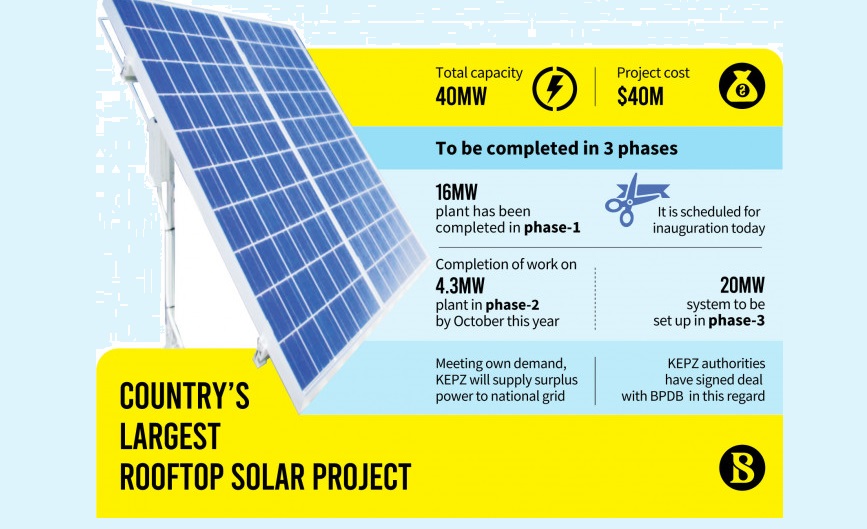
Youngone to have country’s largest rooftop solar plant

The country's largest rooftop solar power project with a cumulative capacity of 40 megawatts (MW) is being commissioned at the Korean Export Processing Zone (KEPZ) in Chattogram – owned by Korean global business conglomerate Youngone.
The project costing an estimated $40 million will be executed in three phases and will cover all the buildings in the EPZ, said the KEPZ authorities.
In the first phase, a 16MW solar photovoltaic (PV) power plant – which itself is the largest ever rooftop solar PV system in the country till date – has been installed at the expense of $16 million and is slated for inauguration by Energy Minister Nasrul Hamid today.
Work on a 4.3MW system that involves a cost of $4.3 million is expected to be complete by October this year, in the second phase.
Another 20MW system – to be set up as an Independent Power Plant (IPP) within a 12-month timeframe in phase-3 of the project – awaits approval from the government, according to officials of KEPZ Corporation.
The power plant will be connected to the national grid and will be eligible for exporting excess power to the grid under a net metering system.
Nazma Binte Alamgir, general manager of Bangladesh Export Processing Zones Authority (BEPZA) told The Business Standard, "No other EPZ has such a large solar power plant with a capacity of as high as 16MW. We have some street lights at the EPZs. Nonetheless, we are encouraging industries to install individual solar power plants to reduce dependency on the national grid."
Sustainable and Renewable Energy Development Authority (SREDA) Chairman Mohammad Alauddin told TBS, "Most of the rooftop solar power plants in Bangladesh are below megawatts capacity. There is a 1MW solar power plant in the Habiganj district set up on the roof of a factory. KEPZ rooftop plant is the largest one in the country.
As the first company, South Korean firm Youngone Corporation set up a private EPZ in Bangladesh in 1996 under the Bangladesh Private EPZ Act and formed a company named "Korean EPZ Corporation (BD) Limited" to promote, develop and manage the EPZ.
At present, 34 world class factories are in operation producing footwear, apparel and textile products in the KEPZ. They have employed around 26,000 people so far.
The EPZ is currently using 14MW power from the Bangladesh Power Development Board (BPDB). It has got approval for using another 14MW from the BPDB for its expanding industries.
In this situation, with a view to making the best use of the power generated by the rooftop solar plants, Youngone Corporation (BD) has signed an agreement with the BPDB for supplying its additional power to the national grid under a back-to-back system.
Speaking on the project, Colonel (retd) Md Shahjahan, managing director of KEPZ Corporation (BD) Limited, told The Business Standard, "We have one of the best solar power plants, as all the high-quality panels have been imported from Korea.
"It has taken around eight months to complete the first phase. KEPZ will not only harness the power of the sun to meet its increasing energy needs in a sustainable manner but also provide any surplus renewable energy to the national grid, demonstrating its commitment to social responsibilities."
Ismail Hossen, executive engineer (distribution department) in Patiya BPDB, Chattogram, said it was good news that an EPZ had entered the clean energy sector.
Regarding the use of the surplus solar power of the EPZ, he said, "The surplus energy of the EPZ will be added to our grid and we will adjust the accounts with them."
"As they have installed a 16MW plant, they will not use much from us. Using this energy, we can give new connections to 12,000-13,000 households if needed," added Ismail.
Bangladesh energy policy aims to increase the share of renewable energy to reach 10% by 2020 and the government has a plan to reach a capacity of 2,400MW by 2021 and 4,000MW by 2030.
Mohammad Hossain, Director General, Power Cell, Ministry of Power, Energy and Mineral Resources, said, "Bangladesh's energy policy aimed to increase the share of renewable energy to reach 10% by 2020 but we achieved only 3.5%. We are working on it. The government is taking many initiatives to increase the share of renewable energy. "
When we think of an economic zone – an area designated for industries – in the country, the image that comes to our mind is of large buildings, heavy industries, and crowded places.
But, the Korean EPZ has changed this preset notion – not for industries but for the greenery, biodiversity and man-made reservoirs it is surrounded with.
The first private EPZ in the country, the KEPZ is located on 2,492 acres of land in Anwara and Karnaphuli upazilas of Chattogram.
The area was once a hilly barren land. But, the land has now turned into a green industrial zone, as 52% of the total area is covered with some 2.4 million trees of 400 species.
Editor & Publisher: S. M. Mesbah Uddin
Published by the Editor from House-45,
Road-3, Section-12, Pallabi, Mirpur
Dhaka-1216, Bangladesh
Call: +01713180024 & 0167 538 3357
News & Commercial Office :
Phone: 096 9612 7234 & 096 1175 5298
e-mail: financialpostbd@gmail.com
HAC & Marketing (Advertisement)
Call: 01616 521 297
e-mail: tdfpad@gmail.com